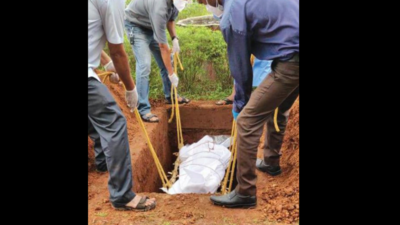Setting green burial trend, some Goans shun coffins for shrouds

A shroud burial in Moira last year
PANAJI: A few Christians and nature lovers are choosing to shun the coffin and be buried in a shroud for environmental reasons.
“I have no intention of being buried in a fancy casket. I am happy with the bamboo stretcher, which hopefully I will fabricate myself,” Saligao resident Joseph Remedios stated in his handwritten will last year. “I will try to buy 6m of muslin cloth to wrap my body in. This will go a long way in curtailing pollution and saving the environment,” he added.
His family, neighbours and friends ensured his wishes were respected when he passed on later that month.
Remedios would save all wet waste generated at home and compost it to grow various vegetables, plants, bananas and papaya trees. “He was one of the founding members of the Saligao Civic and Consumer Cell and he even spent a night up on our hill guarding it when garbage from the coastal belt was being illegally dumped there. His love for the environment was genuine,” his neighbour Gerard Delaney says.
Delaney, too, has made his wishes known to his family well in advance. “I’ve told them that I want a simple burial without any money wasted on flowers or wood wasted on a coffin. This money instead has to be given to a charitable cause,” he told TOI.
“I feel very strongly about this. When I see fancy coffins of mahogany and teak wood, it breaks my heart. The Amazon rainforest and so many other forests are disappearing at an alarming rate. Instead of crying about global warming, I feel we can very much be part of the solution,” said Delaney, a former principal of a higher secondary school at Bicholim.
Around a decade ago Sebastian D’Cruz, who had a great regard for nature, chose an eco- shroud burial.
His relative, architect Dean D’Cruz says Sebastian was a simple man who cycled all over and took part in several ecological activities, like tree planting and digging scales on the hill to harvest rainwater. “He also participated in social activities of helping the communidade as an elderly mentor. His burial in an eco-shroud was his last demonstrative contribution to the village of Saligao,” Dean told TOI.
In the case of Remedios and a relative of Delaney who were buried without coffins, the bamboo stretchers used to move their bodies were made by Hindu neighbours.
“They made bamboo stretchers in both cases and didn’t take a pie from us. The bodies were lowered with the bamboo stretchers,” Delaney said.
However, in both cases he found that the bodies being transported on bamboo stretchers shocked a few people.
“Some found the appearance to be distasteful as they’re so used to seeing someone being carried in a coffin. That’s why I’m researching and trying to arrange for a common, reusable and light coffin that can be kept in the church and used to move a body from the home to the Church and to the cemetery. But there’s no need for the coffin to go down in the grave,” he said, explaining how the body can be lifted out of the coffin and lowered into the grave with the help of a long cloth.
“The person will be buried with dignity and honour,” he said.
Shroud burials were also being propagated in parishes in Mumbai due to space constraints.
“I have no intention of being buried in a fancy casket. I am happy with the bamboo stretcher, which hopefully I will fabricate myself,” Saligao resident Joseph Remedios stated in his handwritten will last year. “I will try to buy 6m of muslin cloth to wrap my body in. This will go a long way in curtailing pollution and saving the environment,” he added.
His family, neighbours and friends ensured his wishes were respected when he passed on later that month.
Remedios would save all wet waste generated at home and compost it to grow various vegetables, plants, bananas and papaya trees. “He was one of the founding members of the Saligao Civic and Consumer Cell and he even spent a night up on our hill guarding it when garbage from the coastal belt was being illegally dumped there. His love for the environment was genuine,” his neighbour Gerard Delaney says.
Delaney, too, has made his wishes known to his family well in advance. “I’ve told them that I want a simple burial without any money wasted on flowers or wood wasted on a coffin. This money instead has to be given to a charitable cause,” he told TOI.
“I feel very strongly about this. When I see fancy coffins of mahogany and teak wood, it breaks my heart. The Amazon rainforest and so many other forests are disappearing at an alarming rate. Instead of crying about global warming, I feel we can very much be part of the solution,” said Delaney, a former principal of a higher secondary school at Bicholim.
Around a decade ago Sebastian D’Cruz, who had a great regard for nature, chose an eco- shroud burial.
His relative, architect Dean D’Cruz says Sebastian was a simple man who cycled all over and took part in several ecological activities, like tree planting and digging scales on the hill to harvest rainwater. “He also participated in social activities of helping the communidade as an elderly mentor. His burial in an eco-shroud was his last demonstrative contribution to the village of Saligao,” Dean told TOI.
In the case of Remedios and a relative of Delaney who were buried without coffins, the bamboo stretchers used to move their bodies were made by Hindu neighbours.
“They made bamboo stretchers in both cases and didn’t take a pie from us. The bodies were lowered with the bamboo stretchers,” Delaney said.
However, in both cases he found that the bodies being transported on bamboo stretchers shocked a few people.
“Some found the appearance to be distasteful as they’re so used to seeing someone being carried in a coffin. That’s why I’m researching and trying to arrange for a common, reusable and light coffin that can be kept in the church and used to move a body from the home to the Church and to the cemetery. But there’s no need for the coffin to go down in the grave,” he said, explaining how the body can be lifted out of the coffin and lowered into the grave with the help of a long cloth.
“The person will be buried with dignity and honour,” he said.
Shroud burials were also being propagated in parishes in Mumbai due to space constraints.
FOLLOW US ON SOCIAL MEDIA
FacebookTwitterInstagramKOO APPYOUTUBE
Start a Conversation
end of article









